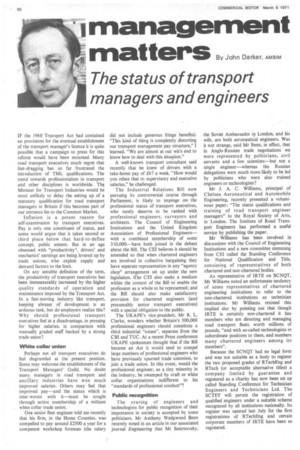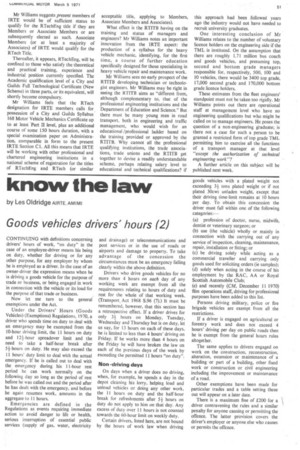management
Page 52

Page 53

If you've noticed an error in this article please click here to report it so we can fix it.
matters By John Darker, AM BIM
The status of transport managers and engineers
IF the 1968 Transport Act had contained no provisions for the eventual establishment of the transport manager's licence it is quite possible that a campaign to press for this reform would have been mounted. Many road transport executives much regret that feet-dragging has so far frustrated the introduction of TML qualifications. The trend towards professionalism in transport and other disciplines is worldwide. Tha Minister for Transport Industries would be most unlikely to delay the setting up of a statutory qualification for road transport managers in Britain if this becomes part of our entrance fee to the Common Market.
Inflation is a potent reason for self-examination by transport executives. Pay is only one constituent of status, and some would argue that it takes second or third place below that hard-to-define concept, public esteem. But in an age obsessed with "productivity", drivers' and mechanics' earnings are being levered up by trade unions, who exploit supply and demand factors to the limit.
On any sensible definition of the term, the productivity of transport executives has been immeasurably increased by the higher quality standards of operation and maintenance imposed by the Transport Act. In a fast-moving industry like transport, keeping abreast of development is an arduous task, but do employers realize this? Why should professional transport executives feel at a disadvantage, in pressing for higher salaries, in comparison with manually graded staff backed by a strong trade union?
White collar union Perhaps not all transport executives do feel disgruntled at the present position. Some may welcome the establishment of the Transport Managers' Guild. No doubt many managers in road transport and ancillary industries have won much improved salaries. Others may feel that improved pay—and the status which is inter-woven with it—must be sought through active membership of a militant white collar trade union.
One senior fleet engineer told me recently that his firm, in the Home Counties, was compelled to pay around £2500 a year for a competent workshop foreman (the salary did not include generous fringe benefits). "This kind of thing is completely distorting our transport management pay structure," I learned. "We are almost at our wit's end to know how to deal with this situation."
A well-known transport consultant said recently that he knew of drivers with a take-home pay of £67 a week. "How would you relate that to supervisory and executive salaries," he challenged.
The Industrial Relations Bill now pursuing its controversial course through Parliament, is likely to impinge on the professional status of transport executives, who surely deserve to be ranked with professional engineers, surveyors and architects. The Council of Engineering Institutions and the United Kingdom Association of Professional Engineers— with a combined membership of some 310,000 have both joined in the debate about the Bill. The CEI believes it should be amended so that when chartered engineers are involved in collective bargaining they have separate representation in any "agency shop" arrangement set up under the new legislation. The CFI also seeks a medium within the context of the Bill to enable the profession as a whole to be represented; and the Bill should also make satisfactory provision for chartered engineers (and presumably senior transport executives) with a special obligation to the public.
The UKAPE's vice-president, Mr R. L. Clarke, wonders whether Britain's 300,000 professional engineers should constitute a third industrial "estate", separate from the CBI and TUC. At a recent Press conference UKAPE spokesmen thought that if the Bill became an Act it would tend to compel large numbers of professional engineers who have previously spurned trade unionism, to join a trade union. In this event, would the professional engineer, as a tiny minority in the industry, be swamped by craft or white collar organizations indifferent to his "standards of professional conduct"?
Public recognition The craving of engineers and technologists for public recognition of their importance in society is accepted by some politicians. Mr Anthony Wedgwood Benn recently noted in an article in our associated journal Engineering that Mr Smirnovsky, the Soviet Ambassador it) London, and his wife, are both aeronautical engineers. Was it not strange, said Mr Benn, in effect, that in Anglo-Russian trade negotiations we were represented by politicians, civil servants and a few scientists—but not a single engineer—whereas the Russian delegations were much more likely to be led by politicians who were also trained engineers or technologists?
Mr J. A. C. Williams, principal of Chelsea Aeronautical and Automobile Engineering, recently presented a voluminous paper: "The status qualifications and training of road transport engineer managers" to the Royal Society of Arts, in London. The Institute of Road Transport Engineers has performed a useful service by publishing the paper.
Mr Williams has been involved in discussions with the Council of Engineering Institutions and a new committee stemming from CEI called the Standing Conference for National Qualification and Title, consisting of representatives of both chartered and non-chartered bodies.
As representative of IRTE on SCNQT, Mr Williams noted an unfortunate tendency of some representatives of chartered engineering institutions to refer to the non-chartered institutions as technician institutions. Mr Williams resisted this implied slur by pointing out that though IRTE is certainly non-chartered it has members who are directing and managing road transport fleets worth millions of pounds, "and with so-called technologists in subordinate positions to them, and numbers many chartered engineers among its members".
Because the SCNQT had no legal form and was not suitable as a body to register the two proposed grades of RTechEng and RTech (or acceptable alternative titles) a company limited by guarantee and registered as a charity has now been set up called Standing Conference for Technician Engineers and Technicians Ltd. The SCTET will permit the registration of qualified engineers under a suitable scheme recognized by all institutions nationally. Its register was opened last July for the first registrations of RTechEng and certain corporate members of IRTE have been so registered.
Mr Williams suggests present members of IRTE would be of sufficient status to qualify for the RTechEng title if they are Members or Associate Members or are subsequently elected as such. Associate Members (or at least a majority of Associates) of IRTE would qualify for the RTech Title.
Thereafter, it appears, RTechEng, will be confined to those who satisfy the theoretical and practical training, experience and industrial position currently specified. The Academic qualification level of a City and Guilds Full Technological Certificate (New Scheme) in three parts, or its equivalent, will shortly become compulsory.
Mr Williams feels that the RTech designation for IRTE members calls for , possession of a City and Guilds Syllabus 168 Motor Vehicle Mechanics Certificate up to at least -Part II level, plus an additional course of some 150 hours duration, with a special examination paper on Administration, comparable in form to the present IRTE Section Cl. All this means that IRTE will be working with other professional and chartered engineering institutions in a national scheme of registration for the titles of RTechEng and RTech (or similar
acceptable title, applying to Members, Associate Members and Associates).
What effect is the RTITB having on the training and status of managers and engineers? Mr Williams notes an important innovation from the IRTE aspect: the production of a syllabus for the heavy vehicle mechanic, identifying, for the first time, a course of further education specifically designed for those specializing in heavy vehicle repair and maintenance work.
Mr Williams sees no early prospect of the RTITB developing technician or technologist engineers. Mr Williams may be right in seeing the RTITB aims as "different from, although complementary to, that of the professional engineering institutions and the Department of Education and Science." But there must be many young men in road transport, both in engineering and traffic management, who would wish for an educational /professional ladder based on the training provided or approved by the RTITB. Why cannot all the professional qualifying institutions, the trade associations, trade unions and the RTITB get together to devise a readily understandable scheme, perhaps relating salary level to educational and technical qualifications? if this approach had been followed years ago the industry would not have needed to recruit university graduates.
One interesting conclusion of Mr Williams relates to the number of voluntary licence holders on the engineering side if the TML is instituted. On the assumption that there are roughly 1.71 million bus coach and goods vehicles, and presuming top, second and bottom grade managers resPonsible for, respectively, 500, 100 and 10 vehicles, there would be 3400 top grade, 17,000 second grade and 170,000 bottom grade licence holders.
These estimates from the fleet engineers' standpoint must not be taken too rigidly. Mr Williams points out there are operational staff at management level who have no engineering qualifications but who might be called on to manage engineers. He poses the question of a non-engineering graduate; is there not a case for such a person to be granted a restricted form of top grade TML permitting him to exercise all the functions of a transport manager at that level "except the authorization of technical engineering work"?
A further article on this subject will be published next week.




































































































